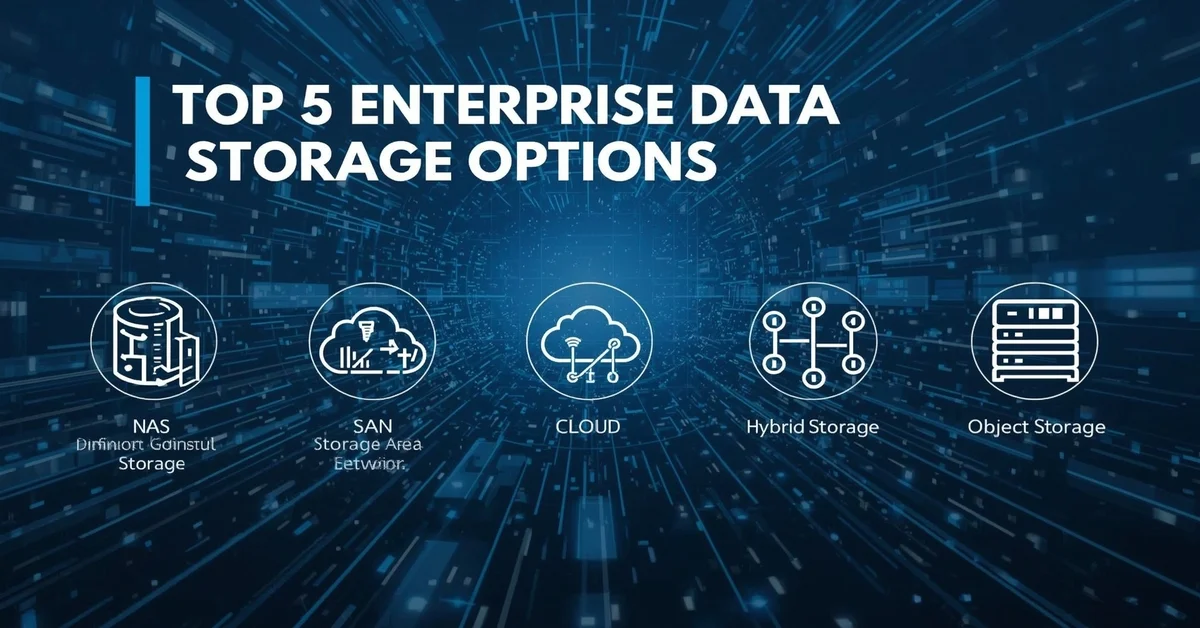In today’s data-driven world, businesses generate more information than ever and need a reliable way to store and protect it. Enterprise data storage provides a central system to manage this growing data. With many options available, choosing the right solution can be challenging.
Top 5 Enterprise Data Storage Solutions to Consider
Below are the most popular and trusted data storage options businesses are using in 2025. Each has its strengths, so you can choose what fits your size, budget, and needs best.
1. Network Attached Storage (NAS)
Network Attached Storage (NAS) is one of the most popular and budget-friendly choices for small to medium-sized businesses. Think of it as a compact data center right within your workplace. NAS connects directly to your company’s local network and allows multiple users and devices to access data at the same time.
Key Benefits of NAS:
- Easy to set up and manage, even for non-IT staff
- Great for file sharing and collaboration
- Supports RAID configurations for data protection
- Lower cost compared to larger systems
- Can be scaled by adding extra drives
When to Use NAS?
NAS works best when you need a shared place for documents, media, backups, and more. It’s not ideal for high-performance apps, but it gets the job done for basic storage needs. Popular brands like Synology and QNAP offer feature-rich NAS solutions with user-friendly interfaces.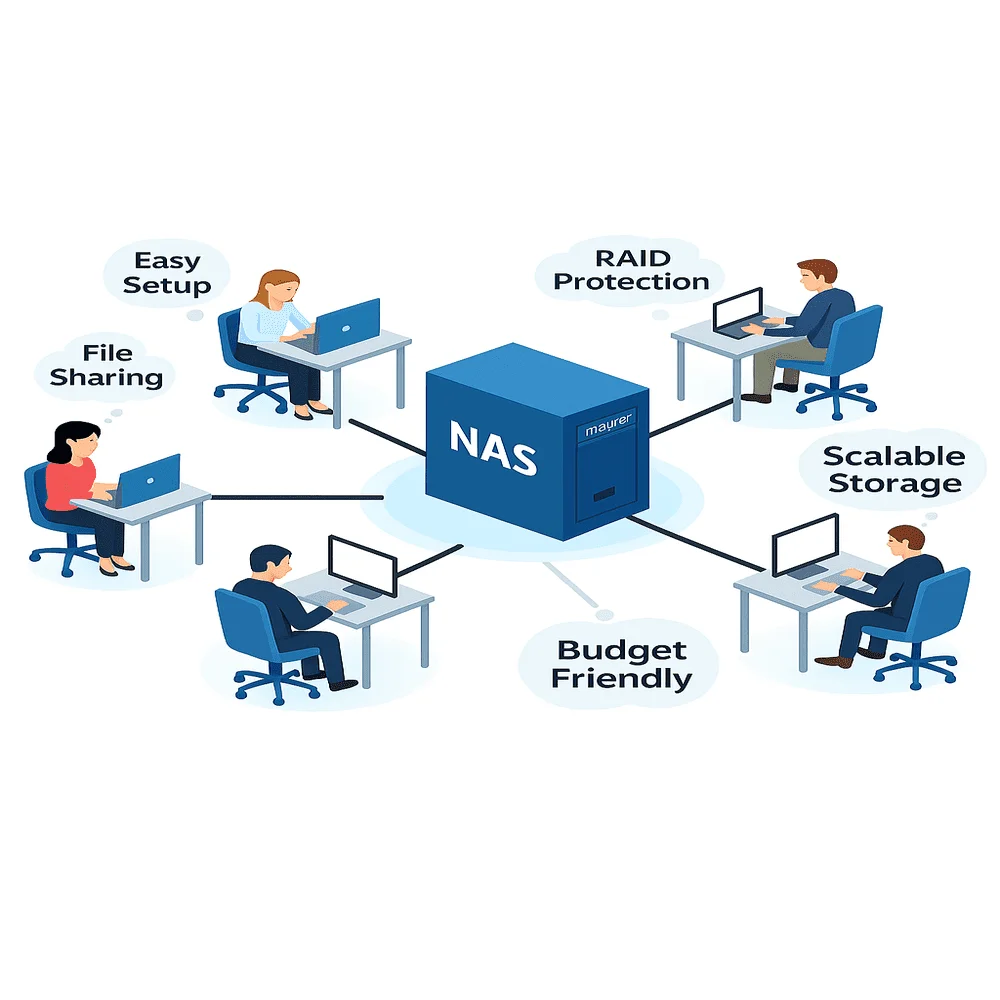
2. Storage Area Network (SAN)
Storage Area Network (SAN) is the big brother of NAS. It’s made for larger businesses that need fast access to huge amounts of data. SAN uses high-speed fiber or Ethernet connections to link multiple storage devices to servers. This setup gives blazing-fast performance and is perfect for databases, virtual machines, and high-traffic websites.
Why SAN is a Smart Choice?
- High-speed data access and low latency
- Ideal for mission-critical applications
- Centralized management for better control
- Supports block-level storage, which is more flexible
SAN Setup and Use Cases
However, SAN systems are more complex and costly to set up and maintain. They usually need a dedicated IT team to handle the configuration. But if your business depends on real-time data and cannot afford delays or downtime, SAN is worth the investment. Top providers in this space include well-known names like Dell EMC, IBM, and NetApp.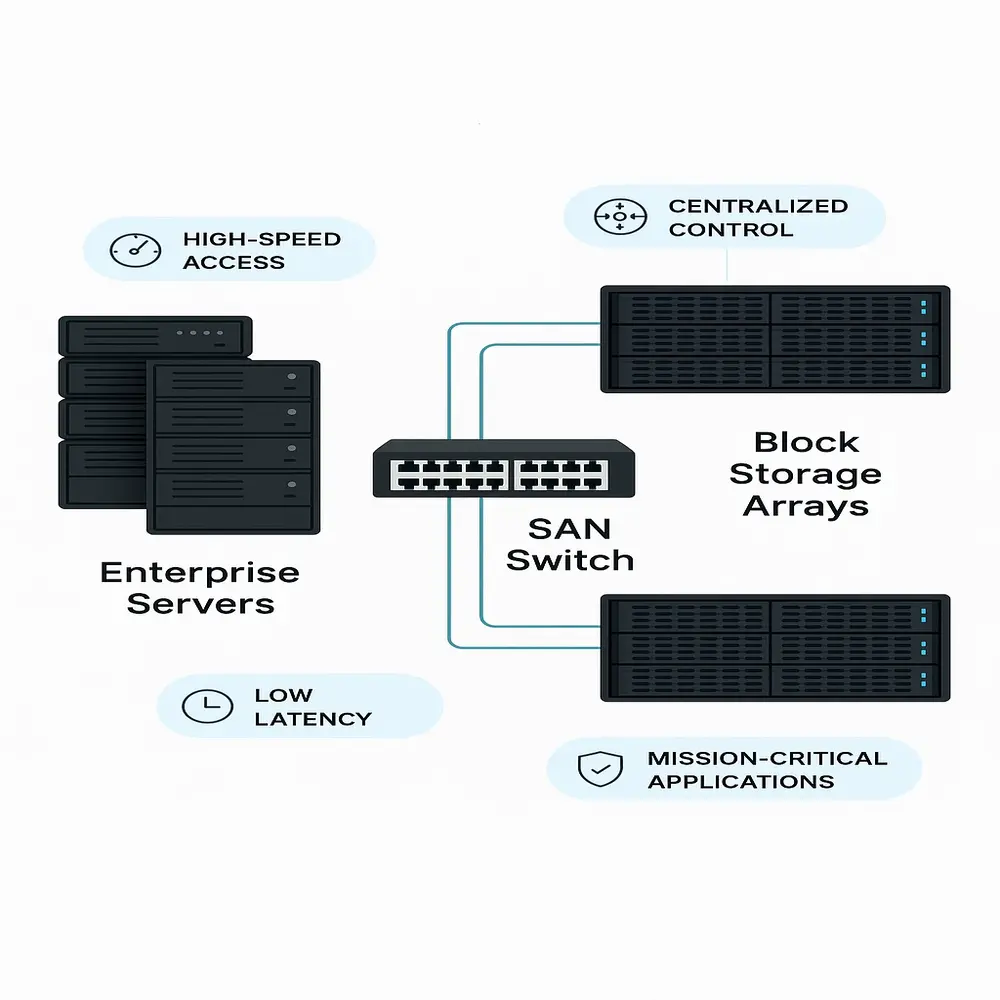
3. Cloud Storage
Cloud storage is quickly becoming the go-to option for businesses of all sizes. It allows you to store data on the internet using remote servers operated by third-party providers. No physical hardware is needed on-site, which saves space and reduces maintenance.
Benefits of Cloud Storage:
- Scalable on-demand pay, only for what you use
- Access from anywhere with an internet connection
- Automatic backups and disaster recovery
- Built-in security and compliance features
- Ideal for hybrid and remote work setups
Cloud Storage Insights
Cloud storage platforms like AWS, Google Cloud, and Azure offer flexible, enterprise-level solutions for storing files, running apps, and backups. While costs and internet speed can be concerns, businesses still prefer cloud storage for its convenience, scalability, and reliability.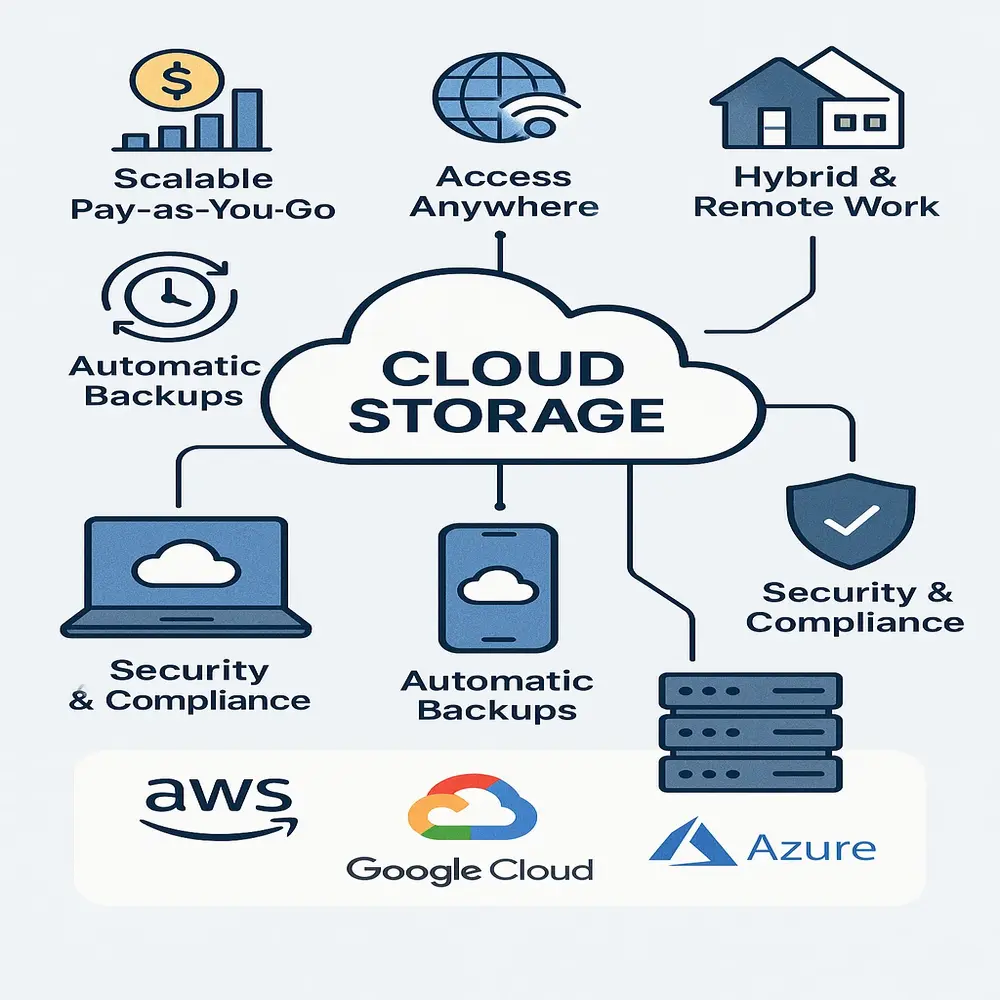
4. Hybrid Storage Solutions
Can’t decide between on-site and cloud storage? Hybrid storage brings together the strengths of local and cloud solutions in a single setup. It lets you store sensitive or high-performance data on local servers while using the cloud for backups, archives, and less-critical files. This approach offers enhanced flexibility, faster access, and reduced operational costs for your business.
Why Choose Hybrid Storage?
- Balance between cost, speed, and security
- Great for businesses with data regulations or privacy needs
- Allows gradual migration to the cloud
- Improved data protection and disaster recovery
How Hybrid Storage Works?
Hybrid storage combines local devices like NAS or SAN with cloud services, offering the speed of on-site access and the flexibility of the cloud. It’s ideal for businesses that need both performance and scalability.
For example
Daily operations can run on local storage while older data is archived in the cloud. This setup requires careful data management to ensure everything stays in sync. With the right tools, hybrid storage becomes a highly efficient and reliable solution.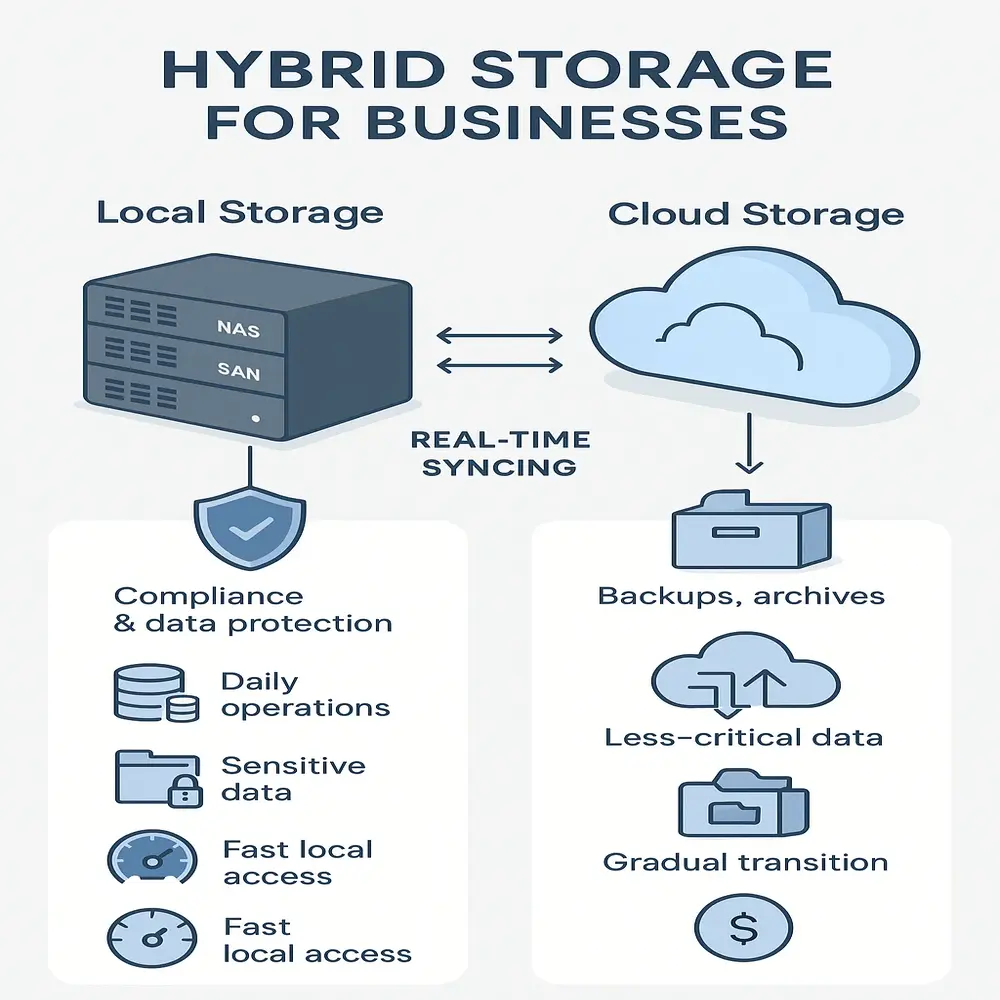
5. Object Storage
Object storage is a modern solution built for storing large amounts of unstructured data, like images, videos, backups, and big data files. Unlike file systems (like NAS) or block storage (like SAN), object storage saves data as “objects” with metadata and a unique ID. It simplifies data retrieval, improves manageability, and allows for effortless scaling as needs grow.
Highlights of Object Storage:
- Perfect for cloud-native applications
- Handles billions of files without slowing down
- Built-in metadata support for better searching
- Great for backups, analytics, and AI/ML workloads
Object Storage Benefits
Object storage is commonly used in cloud platforms like Amazon S3 or IBM Cloud Object Storage. It’s not ideal for traditional apps that require frequent edits or small transactions, but it shines when you need reliable, scalable storage for heavy files and analytics projects.
More companies are turning to object storage because it’s simple, cost-effective, and future-proof. It’s especially helpful for industries like media, healthcare, and research where data grows fast.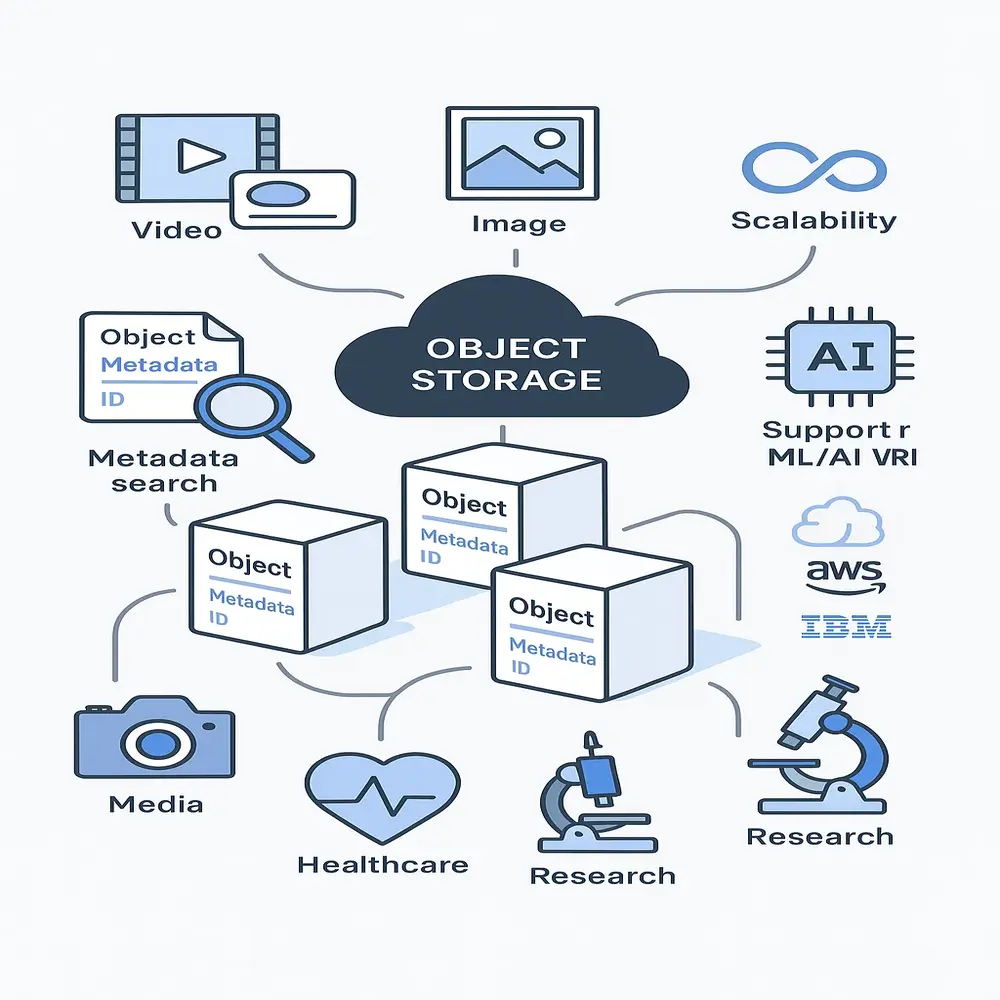
FAQs
With so many options available, how do you choose the right enterprise data storage solution for your business? Here are clear answers to common questions that can guide you toward the most suitable storage solution:
1. How much data do you store now and expect to store later?
Start by estimating your current data volume and how quickly it’s growing. This helps determine whether you need a scalable solution like cloud or object storage.
2. How fast do you need to access your data?
If your business runs on real-time data or uses applications that need low latency, SAN or on-premises storage may be a better fit than cloud options.
3. What’s your budget for setup and maintenance?
While cloud storage lowers initial expenses, the long-term costs can gradually increase. NAS is affordable for small teams, while SAN and hybrid setups usually require a larger investment and skilled IT staff.
4. Do you need remote access or cloud features?
If your team works remotely or across multiple locations, cloud or hybrid storage solutions offer the flexibility and access you need.
5. How critical are data security and compliance to your operations?
Industries like healthcare and finance need strict data security and regulatory compliance. Hybrid and enterprise-grade cloud solutions often come with built-in tools to meet these requirements.
Final Thoughts
To sum up, the right enterprise data storage solution depends on your business needs. NAS suits simple file sharing, SAN supports high-performance tasks, cloud offers flexibility, hybrid combines control and convenience, and object storage handles large unstructured data. Choosing wisely ensures better data management, security, and growth.
